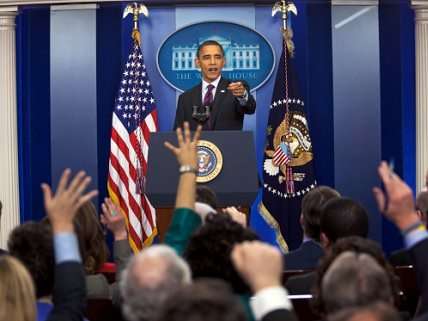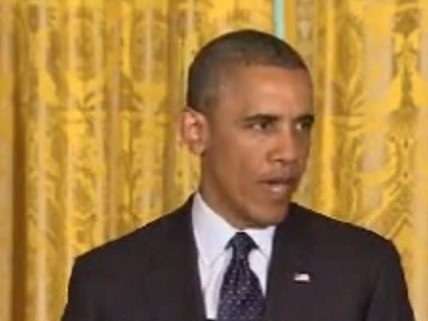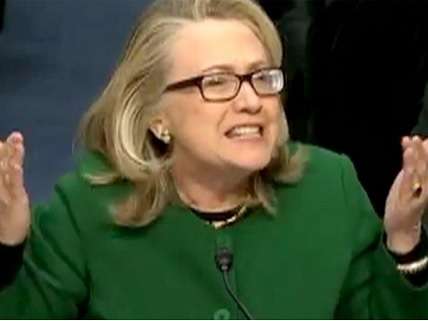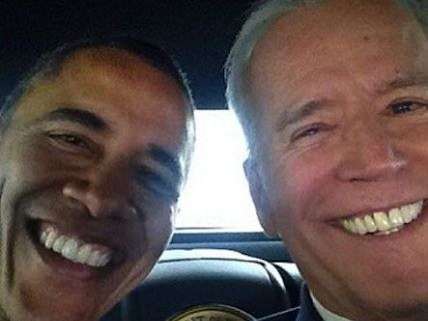The Anatomy of an Obama Scandal
In six easy steps


The Obama administration is riddled with scandals, from guns going missing in Mexico under Operation Fast & Furious to the revelations about the cover up of long wait times at Veterans Administration hospitals. In fact, these scandals have become such a regular occurence that we can now glean a pattern in how the administration gets itself into them, and then how it tries to wiggle itself out. The pattern generally follows six steps.
First, a scandal has to erupt. Often, it arises when the narrative pushed by the president and administration officials reaches the point where it's impossible to reconcile with known truths. For example, the Obama administration considered the Affordable Care Act, passed through Congress divisively in 2010—and which cost Democrats control of the lower chamber in elections later that year—a landmark piece of legislation, a "big fucking deal" in the words of Vice President Joe Biden. It took a lot of promises to get Obamacare passed, promises to legislators and to the public. The president's most famous promise, that if you liked your insurance plan you could keep it, ended up a lie. It could be no other way. The structure of Obamacare relied on restricting the kind of insurance plans individuals could purchase for themselves; the Obamacare website, moreover, may have been destined for failure from the beginning, possessed as administration officials were with the idea that it would succeed through will alone.
Similarly, the fact that the Internal Revenue Service (IRS) was targeting Tea Party-like 501(c)4 groups for extra scrutiny shouldn't have come as a surprise. The Obama campaign spent the run-up to the 2012 election demonizing the Tea Party as well as demonizing both 501(c)4s specifically and campaign spending in general despite, of course, making use of both. Democrats pushed for extra scrutiny for Tea Party groups, so why should it be a surprise when that scrutiny happened?
In Benghazi, meanwhile, the 2012 attack on the U.S. mission, which came less than two months before the election, flew in the face of President Obama's campaign trail assertions that Al Qaeda was on the run. So the president and his underlings instead blamed the terrorist act on a movie clip found on YouTube. The administration's efforts to twist the truth to fit a preferred political agenda is also sometimes abetted by the media. During one of the 2012 presidential debates, for example, CNN's Candice Crowley helped President Obama get away with spinning the specifics of the Benghazi reaction by backing him in a "fact check" while later admitting that debate opponent Mitt Romney was indeed "right in the main."

Second, victims and whistleblowers step forward. So it was with the IRS targeting of Tea Party groups. Naturally, the groups being victimized by the IRS knew about the IRS's actions immediately, and claims of an "enemy's list" came long before the Treasury Inspector General for Tax Administration's May 2013 report. Other times the attention is first drawn to the scandal by whistleblowers. Agents of the Bureau of Alcohol, Tobacco and Firearms (ATF) were partly responsible for bringing the botched Operation Fast & Furious to light. That law enforcement exercise involved walking guns to Mexico for tracking purposes. But then many of those guns went missing, with some popping up at crime scenes south of the border. The most important whistleblower during the Obama administration may have been Edward Snowden, whose revelations reminded the media, and the public, that the government was continuing to engage in the same kind of inappropriate data collection (and more) that scandalized the George W. Bush Administration.
Long wait times at veterans hospitals aren't new either. The Obama administration, in fact, was warned about the issue when it was still transitioning to the White House. The Department of Veterans Affairs (V.A.) was blasted for understating wait times at veterans' hospitals in a V.A. Inspector General's report in 2012. The administration didn't make it an issue because the reality at these hospitals didn't mesh with the idea that veteran care is a top priority for the Obama administration. A series of whistleblowers and revelations of long wait times and cover ups at hospitals across the country over the last month catapulted the scandal into the news cycle.

Third, Obama tells America he's angry. He did it when the IRS scandal couldn't be ignored in the media anymore, telling the press he was angry about it. Obama was angry about the botched Obamacare website rollout, too. This past weekend, the president relayed his anger over the V.A. scandal via an aide. And when he's not angry, he's concerned or frustrated, as he said he was in the wake of whistleblower Edward Snowden's NSA revelations. The president insisted he was preparing to tackle the issues surrounding the secret surveillance programs even before Snowden forced the issue into the public sphere. He said, in fact, that he welcomed the debate, even as his government moved to prosecute Snowden, the whistleblower who made that debate possible. The important thing for the president is to signal to the public that he cares—even in circumstances where he claims he only found out about the issue by reading about it in the paper.

Fourth, the administation starts to drag its feet, and maybe also throws a low-level official under the bus. The Obama administration knew, or should've known, that Healthcare.gov was not ready for its October 2013 launch date. Yet after the botched launch, Secretary of Health and Human Services Kathleen Sebelius could only say that the administration was working to fix it. It took until December for the administration to say it would order a review of the botched launch. In the meantime, the chief information officer for the Centers for Medicare and Medicaid Services resigned. Similarly, while Veterans Affairs Secretary Eric Shinseki says he'll serve as long as he has the president's support, a lower-level V.A. official, an undersecretary for health, did resign this past weekend. Sometimes the resignations are rejected, as NSA chief Keith Alexander's reportedly was. Sometimes higher-level resignations come months later, as Sebelius' did.
The resignations work to create room for the Obama administration to dodge answering questions about the scandals. When President Obama said he was angry about the alleged IRS targeting of Tea Party groups, he also announced the resignation (read: retirement) of the IRS chief.

Fifth, after enough time has passed, the administration will dismiss the scandal as either the result of partisanship or refer to it as "old news." IRS official Lois Lerner, for example, invoked the Fifth Amendment in a congressional hearing on the tax agency's targeting of conservative groups. Just last month she was held in contempt by that congressional committee. Yet President Obama has dismissed the outrage over the IRS scandal as a contrived attempt to make government look bad. But if it's just a partisan stunt, why is Lerner invoking the Fifth Amendment?
The scandal surrounding Benghazi is perhaps the best example of this. A year and a half after the attack, the government says it still doesn't know who perpetrated it. The administration says it's still investigating. That passage of time allows the administration to dismiss open questions about Benghazi as old news. As Hillary Clinton put it, what difference does it make "at this point"? Nor is Clinton alone in that attitude. "Dude, this was like, two years ago," a former National Security Council spokesperson told Fox News when asked for details about the White House's reactions to Benghazi.

Finally, an Obama scandal has run its course when no consequences are felt and the status quo remains the same. Few people are ever actually held accountable for an Obama administration scandal. Most of the IRS officials who left in the wake of the Tea Party debacle have managed to keep their pensions. Indeed, even when such officials purport to resign, they actually just retire; such was the case even for Lois Lerner, who flat-out refused to cooperate with Congress in its investigation. Meanwhile, despite many resignations and retirements, none of the officials implicated in Operation Fast & Furious were fired. The ATF agent who blew the whistle on the program, on the other hand, was fired.
Republicans share the blame here. Despite using their control of House committees to run investigations into various Obama scandals, Republicans have helped the Obama administration make sure the status quo remains the same. House Republicans held years of hearings about Fast & Furious, for example, and even held Attorney General Eric Holder in contempt for failing to hand over documents related to the operation; but the GOP has not moved to review the ATF's budget and scope. Nor has the GOP shown any interest in investigating Bush-era gunrunning operations.
Similarly, while Republicans have held hearings on Benghazi since 2012, and the House recently set up a select committee to investigate, none of these hearings zeroed in on how the 2011 Libyan intervention contributed to the chaotic environment in which the Benghazi attacks happened. Nor has Congress been particularly interested in other consequences of the 2011 intervention, like the proliferation of weapons in the region. Republicans often lose track of the broader issues of government power (be it the ATF, the IRS, the NSA, or any alphabet soup agency that finds itself the center of an Obama scandal) to focus instead on how to leverage specific scandals for partisan gain. This failure to consistently oppose government overreach in turn allows the Obama administration and its apologists to dismiss these various scandals as mere partisan attacks.
